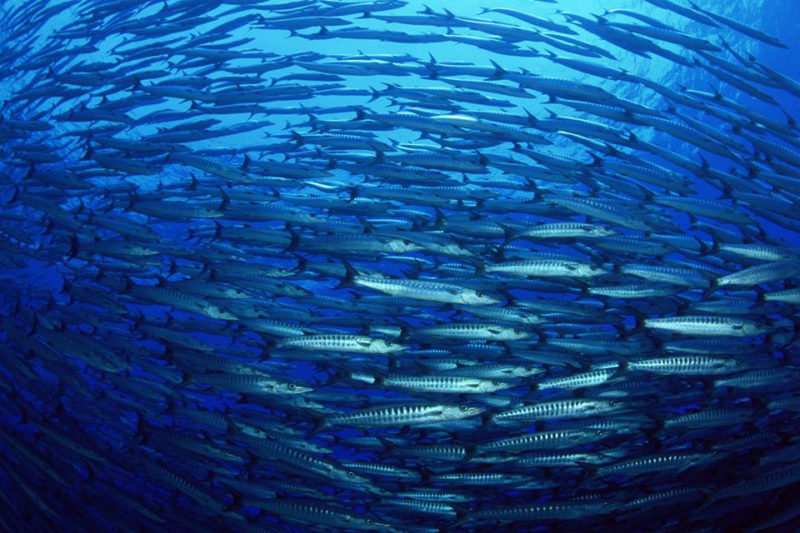A new paper published in Science magazine shows that oxygen concentrations in ocean water are declining, not least as a result of climate change. This is in turn posing a serious threat to marine life and people dependent on the ocean.

The study, compiled by a network of scientists initiated by the UN, also highlights the importance of reining in both climate change and nutrient pollution to halt the expansion of low-oxygen zones spreading around the globe.
“Oxygen in fundamental to life in the oceans,” said Denise Breitburg, lead author and marine ecologist with the Smithsonian Environmental Research Centre. “The decline in ocean oxygen ranks among the most serious effects of human activities on the Earth’s environment.”
The study notes that the oxygen content of the open ocean and coastal waters has been declining for at least the past 50 years, largely because of human activities that increased global temperatures and nutrients discharged to coastal waters.
For example, the amount of water in the open ocean with zero oxygen has increased more than fourfold in the past 50 years whilst in coastal water bodies, including estuaries and seas, low-oxygen sites have gone up over 10-fold since 1950. With rising temperatures, oxygen content in the ocean is projected to decline further, which would threaten biodiversity and result in stunted growth, diseases, suffocation and the death of many animals.
The study – conducted by a team of scientists from the Global Ocean Oxygen Network, a new working group created by the UNESCO’s Intergovernmental Oceanographic Commission – puts the spotlight on the biggest dangers to the ocean and coastal communities, and what it will take to keep Earth’s waters healthy and productive.
Need to Tackle Multiple Causes of Disappearing Oxygen in the World’s Oceans
Climate change is a clear culprit. Due to rising temperatures, warming surface waters make it harder for oxygen to reach the ocean interior. As the ocean gets warmer, the amount of oxygen decreases. In coastal waters, excess nutrient pollution from land creates algal blooms, which drain oxygen as they die and decompose. But there are other causes which need to be addressed in tandem with reducing greenhouse gas emissions.
To keep low oxygen in check, the scientists said the world needs to take on the issue from three angles:
- Address the causes: nutrient pollution and climate change. While neither issue is simple or easy, the steps needed to tackle the problem can benefit people as well as the environment. Better septic systems and sanitation can protect human health and keep pollution out of the water. Cutting fossil fuel emissions not only cuts greenhouse gases and fights climate change, but also slashes dangerous air pollutants like mercury.
- Protect vulnerable marine life. With some low oxygen unavoidable, it is crucial to protect at-risk fisheries from further stress. According to the GO2NE team, this could mean creating marine protected areas or no-catch zones in areas animals use to escape low oxygen, or switching to fish that are not as threatened by falling oxygen levels.
- Improve low-oxygen tracking worldwide. Scientists have a decent grasp of how much oxygen the ocean could lose in the future, but they do not know exactly where those low-oxygen zones will be. Enhanced monitoring, especially in developing countries, and numerical models will help pinpoint which places are most at risk and determine the most effective solutions.
What the UN is Doing to Tackle the Problem
The UN Sustainable Development Goal 14 aims to “conserve and sustainably use the oceans, seas and marine resources for sustainable development.”
Through a wide range of initiatives, the United Nations is leading global efforts to step up cooperation for safeguarding the world’s oceans. Last month, the UN General Assembly recently adopted a resolution to convene negotiations for an international treaty to protect the marine environments of the high seas.
During the United Nations Environment Assembly in Nairobi, Kenya, in December 2017, UN delegates passed a resolution aimed at tackling threats emerging from ocean pollution and preventing plastic waste from entering the ocean. Among other measures, the agreement also envisions the formation of an international task force that will advise countries on ways to combat marine pollution.
The Fijian COP23 Presidency also launched an ocean initiative “The Ocean Pathway” to improve ocean health and protect critical ocean ecosystems threatened by climate change at the annual UN Climate Change Conference in Bonn, Germany, in November last year.
And the UN hosted the high level Ocean Conference last year in order to mobilise efforts to reverse the decline in the health of our ocean for people, planet, and prosperity.
